高中英语必修一第四单元重点难点
- 格式:docx
- 大小:28.94 KB
- 文档页数:10
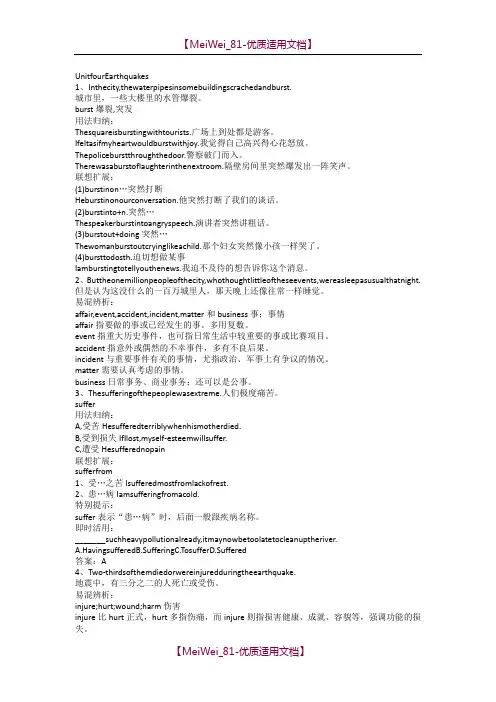
UnitfourEarthquakes1、Inthecity,thewaterpipesinsomebuildingscrachedandburst.城市里,一些大楼里的水管爆裂。
burst爆裂,突发用法归纳:Thesquareisburstingwithtourists.广场上到处都是游客。
Ifeltasifmyheartwouldburstwithjoy.我觉得自己高兴得心花怒放。
Thepoliceburstthroughthedoor.警察破门而入。
Therewasaburstoflaughterinthenextroom.隔壁房间里突然爆发出一阵笑声。
联想扩展:(1)burstinon…突然打断Heburstinonourconversation.他突然打断了我们的谈话。
(2)burstinto+n.突然…Thespeakerburstintoangryspeech.演讲者突然讲粗话。
(3)burstout+doing突然…Thewomanburstoutcryinglikeachild.那个妇女突然像小孩一样哭了。
(4)bursttodosth.迫切想做某事Iamburstingtotellyouthenews.我迫不及待的想告诉你这个消息。
2、Buttheonemillionpeopleofthecity,whothoughtlittleoftheseevents,wereasleepasusualthatnight. 但是认为这没什么的一百万城里人,那天晚上还像往常一样睡觉。
易混辨析:affair,event,accident,incident,matter和business事;事情affair指要做的事或已经发生的事。
多用复数。
event指重大历史事件,也可指日常生活中较重要的事或比赛项目。
accident指意外或偶然的不幸事件,多有不良后果。
incident与重要事件有关的事情,尤指政治、军事上有争议的情况。
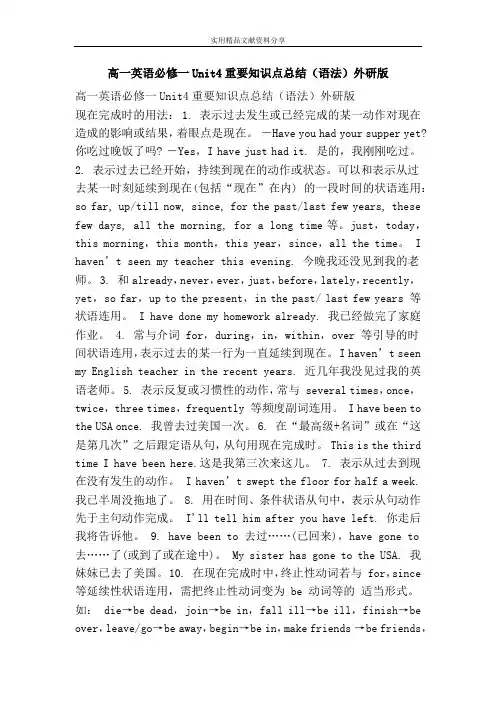
高一英语必修一Unit4重要知识点总结(语法)外研版高一英语必修一Unit4重要知识点总结(语法)外研版现在完成时的用法: 1. 表示过去发生或已经完成的某一动作对现在造成的影响或结果,着眼点是现在。
―Have you had your supper yet? 你吃过晚饭了吗? ―Yes,I have just had it. 是的,我刚刚吃过。
2. 表示过去已经开始,持续到现在的动作或状态。
可以和表示从过去某一时刻延续到现在(包括“现在”在内) 的一段时间的状语连用:so far, up/till now, since, for the past/last few years, these few days, all the morning, for a long time等。
just,today,this morning,this month,this year,since,all the time。
I haven’t seen my teacher this evening. 今晚我还没见到我的老师。
3. 和already,never,ever,just,before,lately,recently,yet,so far,up to the present,in the past/ last few years 等状语连用。
I have done my homework already. 我已经做完了家庭作业。
4. 常与介词 for,during,in,within,over 等引导的时间状语连用,表示过去的某一行为一直延续到现在。
I haven’t seen my English teacher in the recent years. 近几年我没见过我的英语老师。
5. 表示反复或习惯性的动作,常与 several times,once,twice,three times,frequently 等频度副词连用。
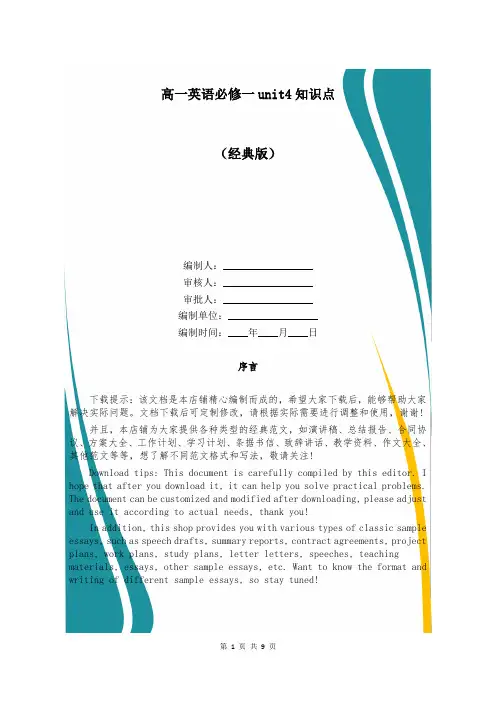
高一英语必修一unit4知识点(经典版)编制人:__________________审核人:__________________审批人:__________________编制单位:__________________编制时间:____年____月____日序言下载提示:该文档是本店铺精心编制而成的,希望大家下载后,能够帮助大家解决实际问题。
文档下载后可定制修改,请根据实际需要进行调整和使用,谢谢!并且,本店铺为大家提供各种类型的经典范文,如演讲稿、总结报告、合同协议、方案大全、工作计划、学习计划、条据书信、致辞讲话、教学资料、作文大全、其他范文等等,想了解不同范文格式和写法,敬请关注!Download tips: This document is carefully compiled by this editor. I hope that after you download it, it can help you solve practical problems. The document can be customized and modified after downloading, please adjust and use it according to actual needs, thank you!In addition, this shop provides you with various types of classic sample essays, such as speech drafts, summary reports, contract agreements, project plans, work plans, study plans, letter letters, speeches, teaching materials, essays, other sample essays, etc. Want to know the format and writing of different sample essays, so stay tuned!高一英语必修一unit4知识点知识能够被获得,并且因为它的本质,知识总是局部的,它永远都不是完整的,所以,一切源于知识的行动也都是局部的、不完整的。
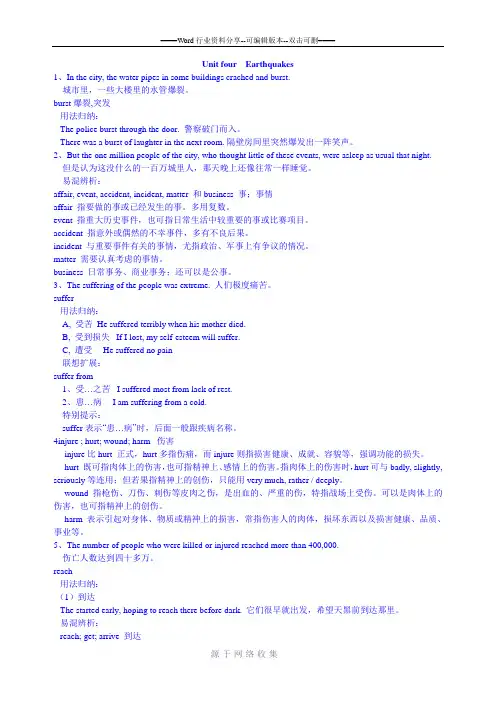
Unit four Earthquakes1、In the city, the water pipes in some buildings crached and burst.城市里,一些大楼里的水管爆裂。
burst爆裂,突发用法归纳:The police burst through the door. 警察破门而入。
There was a burst of laughter in the next room. 隔壁房间里突然爆发出一阵笑声。
2、But the one million people of the city, who thought little of these events, were asleep as usual that night.但是认为这没什么的一百万城里人,那天晚上还像往常一样睡觉。
易混辨析:affair, event, accident, incident, matter 和business 事;事情affair 指要做的事或已经发生的事。
多用复数。
event 指重大历史事件,也可指日常生活中较重要的事或比赛项目。
accident 指意外或偶然的不幸事件,多有不良后果。
incident 与重要事件有关的事情,尤指政治、军事上有争议的情况。
matter 需要认真考虑的事情。
business 日常事务、商业事务;还可以是公事。
3、The suffering of the people was extreme. 人们极度痛苦。
suffer用法归纳:A, 受苦He suffered terribly when his mother died.B, 受到损失If I lost, my self-esteem will suffer.C, 遭受 He suffered no pain联想扩展:suffer from1、受…之苦I suffered most from lack of rest.2、患…病I am suffering from a cold.特别提示:suffer表示“患…病”时,后面一般跟疾病名称。
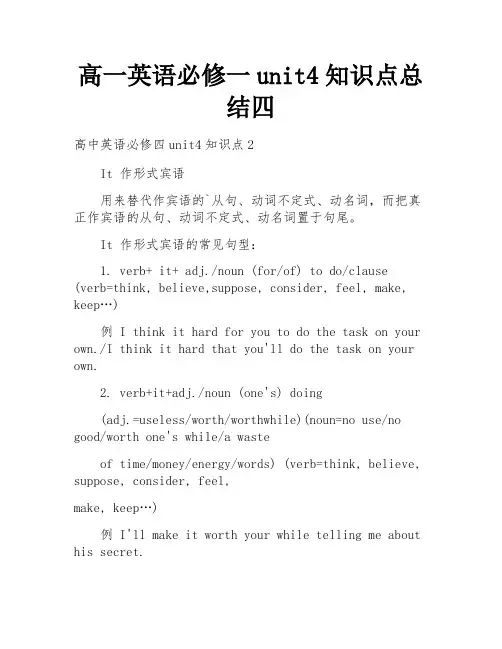
高一英语必修一unit4知识点总结四高中英语必修四unit4知识点2It 作形式宾语用来替代作宾语的`从句、动词不定式、动名词,而把真正作宾语的从句、动词不定式、动名词置于句尾。
It 作形式宾语的常见句型:1. verb+ it+ adj./noun (for/of) to do/clause (verb=think, believe,suppose, consider, feel, make, keep…)例 I think it hard for you to do the task on your own./I think it hard that you'll do the task on your own.2. verb+it+adj./noun (one's) doing(adj.=useless/worth/worthwhile)(noun=no use/no good/worth one's while/a wasteof time/money/energy/words) (verb=think, believe, suppose, consider, feel,make, keep…)例 I'll make it worth your while telling me about his secret.3.verb+it+important/unimportant/necessary/unnecessary/ natural/essential that … (should)…verb+it+ofmuch/great/no/little importancetha t…(should)…(verb=think, believe, suppose, consider, feel, make, keep…)例 I think it important that you (should) attendthe conference.4. verb + it+ as+ noun/adj.+ clause (verb=accept, regard, take, see,view)例 The lecturer takes it as encouraging when so many students attendhis lecture.5. v. +it + prep. + that…owe it to sb. that…把…归功于…leave it to sb that…把…留给某人去做take it for granted that …想当然keep it in mind that…例 Don't bother to arrange anything. Just leave it to me to sort out.6. It用在不能直接跟宾语从句的动词后面,尤其是表示好恶的动词后,enjoy,like, love, dislike, resent, hate, don't mind, be fond of, feel like, see to 宾语从句紧跟it之后例 I hate it you can swim so well and I can't.7. It用在不能直接跟宾语从句的介词后面,宾语从句紧跟it之后(except that例外)例 I'm for it that you will follow their advice.高一英语必修一unit4知识点总结 (菁选2篇)(扩展4)——英语高一必修1知识点总结5篇英语高一必修1知识点总结1重点单词major local represent curious introduceapproach stranger express action generalavoid misunderstand similar agreement *punish intend means universal culturalapologize behave bow flight defencedormitory canteen dash fortable distanceprefer touch custom false hugfunction international powerful greet fistyawn threaten respectful association gesture英语高一必修1知识点总结2重点句子1. Whichever and whatever you like, there is a theme park for you!2. With all these attractions, no wonder tourism is increasing wherever there is a Disneyland.3. To enter a world of fantasy about ancient England, e to Camelot Park!4. Futuroscope is not only for inpiduals, but is also the perfect mix of fun and learning for class outings.5. If driving, Futuroscope is within easy reach of the freeway.6. Visit the candy shop to try the same kind of candy that American southerners made 150years ago, or take a ride on the only steam engine train still working in the …7. After that, joined some drivers and went to the bottom of the ocean to see the strange blind creatures that have never seen sunlight.Visitors can get close to parts of the world they have never experienced, going to the bottom of the ocean, flying through the jungle or visiting the edges of the solar system。
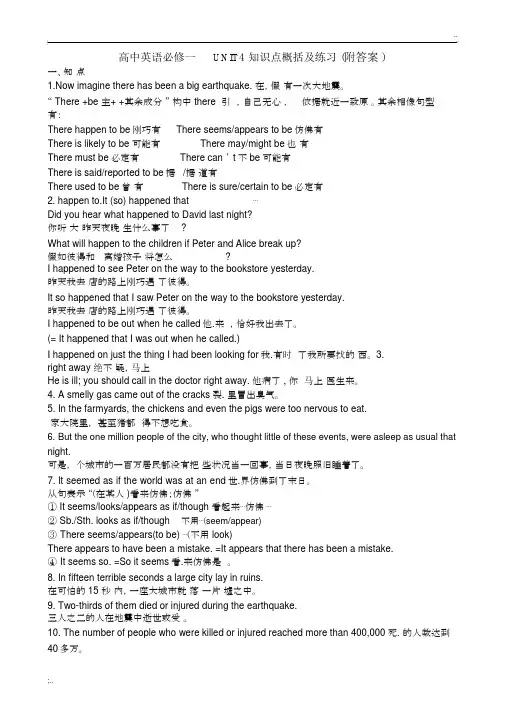
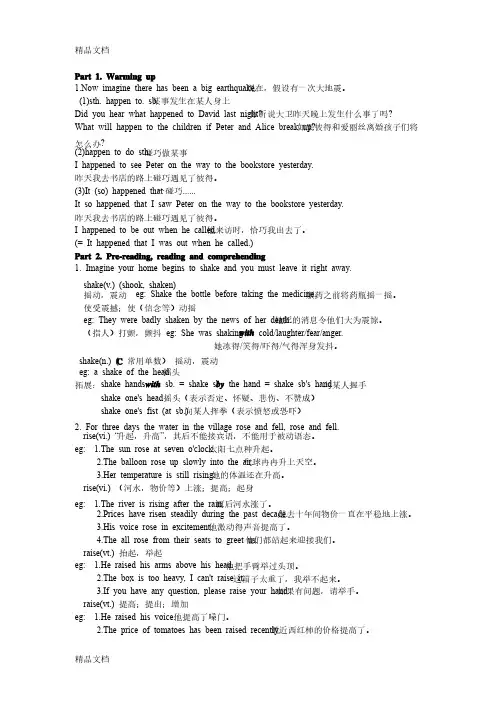
Part 1. Warming up1.Now imagine there has been a big earthquake. 现在,假设有一次大地震。
(1)sth. happen to. sb.某事发生在某人身上Did you hear what happened to David last night? 你听说大卫昨天晚上发生什么事了吗? What will happen to the children if Peter and Alice break up? 如果彼得和爱丽丝离婚孩子们将怎么办? (2)happen to do sth.碰巧做某事I happened to see Peter on the way to the bookstore yesterday. 昨天我去书店的路上碰巧遇见了彼得。
(3)It (so) happened that …碰巧...... It so happened that I saw Peter on the way to the bookstore yesterday. 昨天我去书店的路上碰巧遇见了彼得。
I happened to be out when he called. 他来访时,恰巧我出去了。
(= It happened that I was out when he called.) Part 2. Pre-reading, reading and comprehending1. Imagine your home begins to shake and you must leave it right away. shake(v.) (shook, shaken) 摇动,震动eg: Shake the bottle before taking the medicine. 服药之前将药瓶摇一摇。
使受震撼;使(信念等)动摇eg: They were badly shaken by the news of her death. 她死的消息令他们大为震惊。
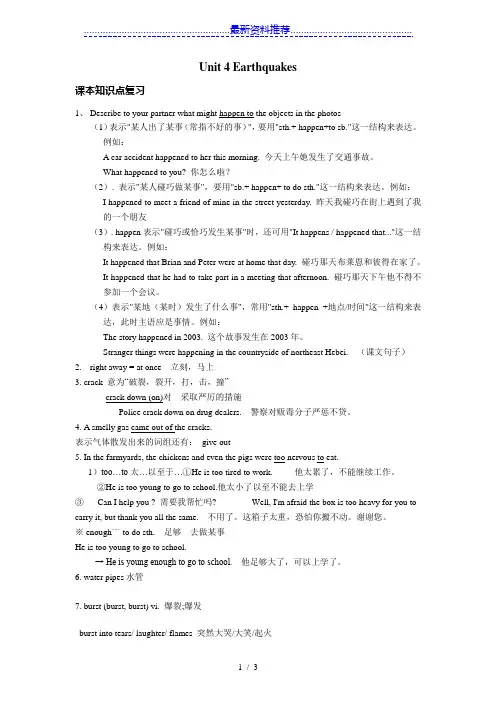
Unit 4 Earthquakes课本知识点复习1、Describe to your partner what might happen to the objects in the photos(1)表示"某人出了某事(常指不好的事)",要用"sth.+ happen+to sb."这一结构来表达。
例如:A car accident happened to her this morning. 今天上午她发生了交通事故。
What happened to you? 你怎么啦?(2). 表示"某人碰巧做某事",要用"sb.+ happen+ to do sth."这一结构来表达。
例如:I happened to meet a friend of mine in the street yesterday. 昨天我碰巧在街上遇到了我的一个朋友(3). happen表示"碰巧或恰巧发生某事"时,还可用"It happens / happened that..."这一结构来表达。
例如:It happened that Brian and Peter were at home that day. 碰巧那天布莱恩和彼得在家了。
It happened that he had to take part in a meeting that afternoon. 碰巧那天下午他不得不参加一个会议。
(4)表示"某地(某时)发生了什么事",常用"sth.+ happen +地点/时间"这一结构来表达,此时主语应是事情。
例如:The story happened in 2003. 这个故事发生在2003年。
Stranger things were happening in the countryside of northeast Hebei. (课文句子)2.right away = at once 立刻,马上3. crack 意为“破裂,裂开,打,击,撞”crack down (on)对···采取严厉的措施Police crack down on drug dealers. 警察对贩毒分子严惩不贷。
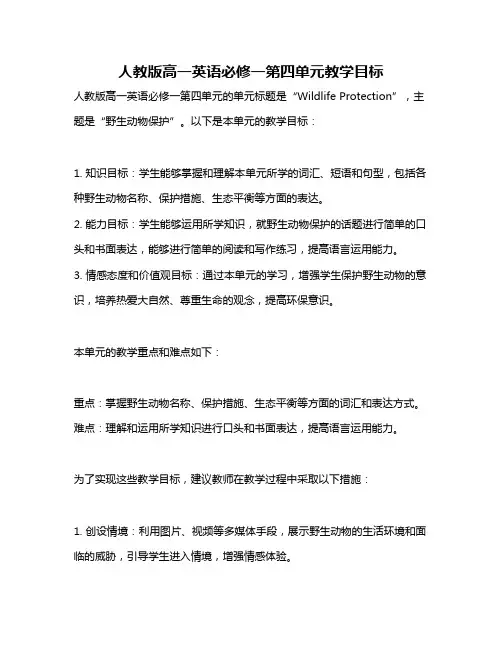
人教版高一英语必修一第四单元教学目标
人教版高一英语必修一第四单元的单元标题是“Wildlife Protection”,主题是“野生动物保护”。
以下是本单元的教学目标:
1. 知识目标:学生能够掌握和理解本单元所学的词汇、短语和句型,包括各种野生动物名称、保护措施、生态平衡等方面的表达。
2. 能力目标:学生能够运用所学知识,就野生动物保护的话题进行简单的口头和书面表达,能够进行简单的阅读和写作练习,提高语言运用能力。
3. 情感态度和价值观目标:通过本单元的学习,增强学生保护野生动物的意识,培养热爱大自然、尊重生命的观念,提高环保意识。
本单元的教学重点和难点如下:
重点:掌握野生动物名称、保护措施、生态平衡等方面的词汇和表达方式。
难点:理解和运用所学知识进行口头和书面表达,提高语言运用能力。
为了实现这些教学目标,建议教师在教学过程中采取以下措施:
1. 创设情境:利用图片、视频等多媒体手段,展示野生动物的生活环境和面临的威胁,引导学生进入情境,增强情感体验。
2. 小组合作:组织学生进行小组讨论,分享彼此对野生动物保护的认识和想法,提高合作意识和沟通能力。
3. 案例分析:选取一些野生动物保护的案例,让学生分析其中的问题和解决方案,培养批判性思维和解决问题的能力。
4. 拓展阅读:推荐一些关于野生动物保护的英文文章或网站,引导学生进行拓展阅读,提高阅读能力和文化素养。
5. 作业与评价:布置与本单元主题相关的作业,如写一篇关于野生动物保护的短文或制作一份宣传海报等,通过多种方式进行评价和反馈,帮助学生发现不足并改进。
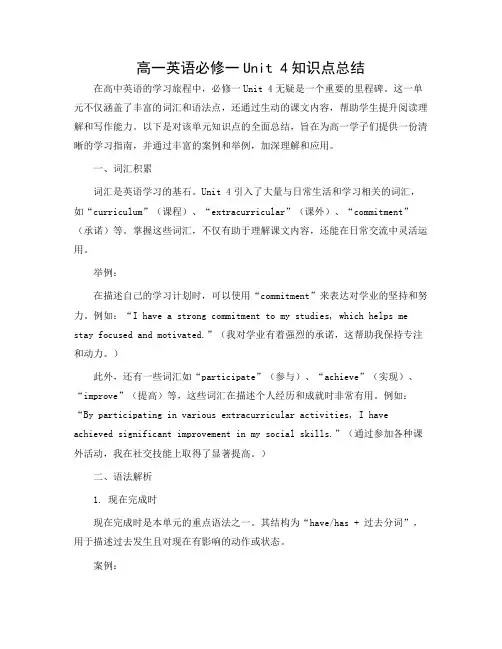
高一英语必修一Unit 4知识点总结在高中英语的学习旅程中,必修一Unit 4无疑是一个重要的里程碑。
这一单元不仅涵盖了丰富的词汇和语法点,还通过生动的课文内容,帮助学生提升阅读理解和写作能力。
以下是对该单元知识点的全面总结,旨在为高一学子们提供一份清晰的学习指南,并通过丰富的案例和举例,加深理解和应用。
一、词汇积累词汇是英语学习的基石。
Unit 4引入了大量与日常生活和学习相关的词汇,如“curriculum”(课程)、“extracurricular”(课外)、“commitment”(承诺)等。
掌握这些词汇,不仅有助于理解课文内容,还能在日常交流中灵活运用。
举例:在描述自己的学习计划时,可以使用“commitment”来表达对学业的坚持和努力。
例如:“I have a strong commitment to my studies, which helps me stay focused and motivated.”(我对学业有着强烈的承诺,这帮助我保持专注和动力。
)此外,还有一些词汇如“participate”(参与)、“achieve”(实现)、“improve”(提高)等,这些词汇在描述个人经历和成就时非常有用。
例如:“By participating in various extracurricular activities, I have achieved significant improvement in my social skills.”(通过参加各种课外活动,我在社交技能上取得了显著提高。
)二、语法解析1. 现在完成时现在完成时是本单元的重点语法之一。
其结构为“have/has + 过去分词”,用于描述过去发生且对现在有影响的动作或状态。
案例:小李在英语课上被问到:“Have you finished your homework?”(你完成作业了吗?)小李回答:“Yes, I have finished it.”(是的,我已经完成了。

Unit four Earthquakes1、In the city, the water pipes in some buildings crached and burst.城市里,一些大楼里的水管爆裂。
burst爆裂,突发用法归纳:The square is bursting with tourists. 广场上到处都是游客。
I felt as if my heart would burst with joy.我觉得自己高兴得心花怒放。
The police burst through the door. 警察破门而入。
There was a burst of laughter in the next room.隔壁房间里突然爆发出一阵笑声。
联想扩展:(1) burst in on…突然打断He burst in on our conversation. 他突然打断了我们的谈话。
(2) burst into +n. 突然…The speaker burst into angry speech. 演讲者突然讲粗话。
(3) burst out + doing突然…The woman burst out crying like a child. 那个妇女突然像小孩一样哭了。
(4) burst to do sth. 迫切想做某事I am bursting to tell you the news. 我迫不及待的想告诉你这个消息。
2、But the one million people of the city, who thought little of these events, were asleep as usual that night.但是认为这没什么的一百万城里人,那天晚上还像往常一样睡觉。
易混辨析:affair, event, accident, incident, matter 和business 事;事情affair 指要做的事或已经发生的事。
高一必修一unit4知识点高一必修一 Unit 4 知识点在高中英语教学中,Unit 4 是学生们接触到的第一个阅读课程,本单元主要围绕着信息导图这一主题展开。
在学习过程中,我们不仅要掌握阅读技巧,还需要理解和运用一些重要的语言知识点。
本文将围绕 Unit 4 的知识点展开探讨。
一、词汇篇1. summarize (v.) –汇总,总结In order to understand the article better, it's important to summarize each paragraph.2. compare (v.) –比较Let's compare the two articles and find the similarities and differences between them.3. distinguish (v.) –区分,辨别It is difficult to distinguish between twins because they look so similar.4. distinguish…from… –将…与…区分开来It is important to distinguish fact from fiction when reading news sources.5. classify (v.) –分类,归类The books in the library are classified according to genre and author.6. edit (v.) –编辑,剪辑The editor will edit your article before it is published.7. revise (v.) –修订,修改Before submitting the essay, make sure to revise and correct any grammatical errors.8. transfer (v.) –转移,转换The teacher encouraged the students to transfer their knowledge from the textbook to real-life situations.二、语法篇1. used to do sth. –过去常常做某事(现在不做了)I used to play basketball every Sunday, but now I prefer swimming.2. be used to –习惯于After living in the city for a year, I am used to the noise and fast pace of life.3. be/get accustomed to –习惯于She got accustomed to waking up early after a week of early morning meetings.4. be/get used to –习惯于After wearing glasses for a month, she finally got used to them.5. prefer…to… –更喜欢…而不是…I prefer watching movies to reading books because they are more visually stimulating.6. instead of –代替,而不是Instead of going out, I decided to stay at home and work on my homework.7. neither…nor…–既不…也不…Neither John nor Jane enjoys playing video games.8. both…and… –既…and…Both the teachers and the students participated in the school's charity event.三、阅读理解在阅读理解中,我们需要掌握一些常用的阅读技巧,如略读、精读、找关键词等。
高一英语人教版必修第一册期末复习重难点知识集锦Unit4(知识点)Unit 4 Natural Disasters Part one V ocabulary1. rescue n. & vt. 营救;救援come/go to sb.’s rescue 来/去救助某人rescue team/workers 救援队/人员rescue …from … 把……从……中解救出来2. damage vt. 损害;破坏n. 损坏;损失do/cause damage to… 对……造成损害/破坏3. affect vt.影响;(疾病)侵袭;深深打动affect = have an effect on 影响4. ruin n. & vt. 破坏;毁坏in ruins 严重受损;破败不堪go/come to ruin 灭亡;荒废5. shock n. 震惊;令人震惊的事;休克vt. (使)震惊in shock 震惊;吃惊in a state of shock 惊魂未定be shocked to do sth. 对做某事感到震惊6. trap vt. 使落入陷阱;使陷入圈套n. 险境;陷阱be trapped in 被困在……中,陷在……中trap sb. into doing sth. 陷害/诱骗某人做某人7. bury vt.埋葬;安葬bury oneself in = be buried in 埋头于;专心于8. breathe vi.& vt.呼吸breath n. 呼吸out of breathe 气喘吁吁地hold one’s breath 屏住呼吸9. supply n. 供应(量);补给;[pl.]补给品vt. 供应;供给supply sth. to sb. =supply sb. with sth.给某人提供某物10. survive vi. 生存;存活vt. 幸存;艰难度过survive on sth. = live on sth. 靠……存活11.calm adj. 镇静的;沉着的vt. 使平静;使镇静calm down 冷静下来keep calm 保持冷静12. aid n. 援助;帮助;救援物资vi. & vt. (formal) 帮助;援助first aid 急救with the aid of =with sb’s aid 在某人的帮助下13. sweep vt. & vi. (swept, swept) 打扫;清扫sweep away 消灭;彻底消除sweep over 突然袭来14. strike vi.& vt. (struck, struck/stricken)侵袭;突击;击打n. 罢工;罢课;袭击be on strike 在罢工it strike sb. that … 某人突然想到……15. deliver vt. &vi. 递送;传达vt. 发表be delivered of = give birth to 生产;分娩deliver a speech 发表演讲16. length n. 长;长度in length 在长度上at arm's length 在伸手可及处;保持一定距离地Part two Grammar定语从句定语从句(Attributive Clauses)在句中做定语,修饰一个名词或代词,被修饰的名词,词组或代词即先行词。
人教版高中英语必修一Unit 4【重点单词】earthquake [ˈə:θkweik] n. 地震well [wel] n. 井crack [kræk]n. 裂缝;噼啪声vt. & vi. (使)开裂;破裂smelly [ˈsmeli:] adj. 发臭的;有臭味的farmyard [ˈfɑ:mˌjɑ:d] n. 农场;农家pipe [paɪp] n. 管;导管burst [bə:st] vi. (burst, burst) 爆裂;爆发n. 突然破裂;爆发million [ˈmiljən] n. 百万event [iˈvent] n. 事件;大事nation [ˈneiʃən] n. 民族;国家;国民canal [kəˈnæl] n. 运河;水道steam [sti:m] n. 蒸汽;水汽dirt [dɜːt] n. 污垢;泥土ruin [ˈruin] n. 废墟;毁灭vt. 毁灭;使破产suffering [ˈsʌfərɪŋ] n. 苦难;痛苦extreme [iksˈtri:m] adj. 极度的injure [ˈindʒə] vt. 损害;伤害survivor [səˈvaivə] n. 幸存者;生还者;残存物destroy [disˈtrɔi] vt. 破坏;毁坏;消灭brick [brik] n. 砖;砖块dam [dæm] n. 水坝;堰堤track [træk] n. 轨道;足迹;痕迹useless [ˈju:slis] adj. 无用的;无效的;无益的shock [ʃɔk] vt. & vi. (使)震惊;震动n. 休克;打击;震惊rescue [ˈreskju:] n. & vt. 援救;营救trap [træp] vt. 使陷入困境n. 陷阱;困境electricity [ilekˈtrisiti] n. 电;电流;电学disaster [diˈzɑ:stə] n. 灾难;灾祸bury ['berɪ] vt. 埋葬;掩埋;隐藏mine [maɪn] n. 矿;矿山;矿井miner ['maɪnə] n. 矿工shelter [ˈʃeltə] n. 掩蔽;掩蔽处;避身处title [ˈtaitl] n. 标题;头衔;资格reporter [riˈpɔ:tə] n. 记者bar [bɑː] n. 条;棒;条状物damage [ˈdæmidʒ] n. & vt. 损失;损害frighten [ˈfraitən] vt. 使惊吓;吓唬frightened ['fraɪtnd] adj. 受惊的;受恐吓的frightening ['fraɪt(ə)nɪŋ]adj. 令人恐惧的congratulation [kənˌɡrætjuˈleiʃən] n. 祝贺;(复数)贺词judge [dʒʌdʒ] n. 裁判员;法官vt. 断定;判断;判决sincerely [sɪnˈsɪəlɪ] adv. 真诚地;真挚地express [iksˈpres] vt. 表示;表达n. 快车;速递outline [ˈautlain] n. 要点;大纲;轮廓headline ['hedlaɪn] n. 报刊的大字标题cyclist [ˈsaɪklɪst] n. 骑自行车的人【重点短语】1.have time to do sth. 有时间做某事2.happen to do sth. 碰巧做某事3.shake hands with sb. 与某人握手4.burst into tears/ laughter=burst out crying/laughing 突然哭/笑起来5.in ruins 成为废墟6.blow away 吹走,刮走7.fall down 倒塌8.be pleased to do sth. 乐意做某事9.make/ give a speech 发表演说10.judging…from 根据……来判断11.dig out 挖掘12.a great/ large number of =a great/good many 大量的13.be trapped in/ under 陷入/陷在……下面14.have/make/let sb. do sth. 让某人做某事e to an end = put/ bring sth. to an end = put/ bring an end to sth. 结束某事16.be proud of / take pride in 因……而自豪17.invite sb. to do sth. 邀请某人做某事18.think little of 对……评价低19.think highly of 对……评价高20.give out 发出(气味等);分发;耗尽21.give away 赠送;泄露22.agree on ... 在……上达成共识【重点句型】1. The number of people who were killed or injured in the earthquake reached more than 400,000.(定语从句)地震中的死伤人数达到40多万。
高一英语必修一第四单元主要知识难点2023高一年级英语必修一第四单元知识点1rightaway毫不迟疑,立刻Itseemedasiftheworldwasatanend.世界似乎到了末日。
从句表示“(在某人)看来好像;似乎”①Itseems/looks/appearsasif/though…看起来好像…②Sb./Sth.looksasif/though…③Thereseems/appears(tobe)…Thereappearstohavebeenamistake.2.inruins.变为废墟Two-thirdsWorkersbuiltsheltersforsurvivorswhosehomeshadbeendestroyed.5.undertheweightof 在……重压下,迫于6.intheopenair在户外,在野外,露天7.taketurnstodosth依次,轮流做某事inturn依次地,轮流地8.beshockedat对……感到震惊9.beproudof以……为自豪10.expressone’sthankstosb/forsth…对/因……表示感谢11.withoutwarning毫无预兆nextto紧接着,相邻,次于getawayfrom…避免,摆脱,离开14.disaster-hitareas灾区ListeningtoEnglishisaveryimportantskillbecauseitisonlywhenweunderstandwhatissai dtousthatwecanhaveaconversationwithsomebody.听英语是一项很重要的技能,因为只有当我们懂得别人给我们说什么我们才能与他交谈。
Itisbelievedthat人们认为…17.holdup举起;托住;支撑列举,推举18.makeup弥补,虚构,整理,和解,化妆,拼凑19.betrappedin被困于…Itissaidthat…据说...befixedto…被固定到……22.betiedto…被绑在……高一年级英语必修一第四单元知识点2devotes…todoing奉于fightagainst对抗,反对,与……作斗争3.selflessly无私地befreefrom免于,不受beinprison入狱,在狱中服刑6.thefirstmantodo第一个…的人ThetimewhenIfirstmethimwasaverydifficultperiodofmylife.第一次见到他的时候是在我一生中非常艰难的时期。
Unit four Earthquakes1、In the city, the water pipes in some buildings crached and burst.城市里,一些大楼里的水管爆裂。
burst爆裂,突发用法归纳:The square is bursting with tourists. 广场上到处都是游客。
I felt as if my heart would burst with joy.我觉得自己高兴得心花怒放。
The police burst through the door. 警察破门而入。
There was a burst of laughter in the next room.隔壁房间里突然爆发出一阵笑声。
联想扩展:(1) burst in on…突然打断He burst in on our conversation. 他突然打断了我们的谈话。
(2) burst into +n. 突然…The speaker burst into angry speech. 演讲者突然讲粗话。
(3) burst out + doing突然…The woman burst out crying like a child. 那个妇女突然像小孩一样哭了。
(4) burst to do sth. 迫切想做某事I am bursting to tell you the news. 我迫不及待的想告诉你这个消息。
2、But the one million people of the city, who thought little of these events, were asleep as usual that night.但是认为这没什么的一百万城里人,那天晚上还像往常一样睡觉。
易混辨析:affair, event, accident, incident, matter 和business 事;事情affair 指要做的事或已经发生的事。
多用复数。
event 指重大历史事件,也可指日常生活中较重要的事或比赛项目。
accident 指意外或偶然的不幸事件,多有不良后果。
incident 与重要事件有关的事情,尤指政治、军事上有争议的情况。
matter 需要认真考虑的事情。
business 日常事务、商业事务;还可以是公事。
3、The suffering of the people was extreme. 人们极度痛苦。
suffer用法归纳:A, 受苦He suffered terribly when his mother died.B, 受到损失If I lost, my self-esteem will suffer.C, 遭受He suffered no pain联想扩展:suffer from1、受…之苦I suffered most from lack of rest.2、患…病I am suffering from a cold.特别提示:suffer表示“患…病”时,后面一般跟疾病名称。
即时活用:_______ such heavy pollution already , it may now be too late to clean up the river .A. Having sufferedB. SufferingC. To sufferD. Suffered答案:A4、Two-thirds of them died or were injured during the earthquake.地震中,有三分之二的人死亡或受伤。
易混辨析:injure ; hurt; wound; harm伤害injure比hurt 正式,hurt多指伤痛,而injure则指损害健康、成就、容貌等,强调功能的损失。
hurt 既可指肉体上的伤害,也可指精神上、感情上的伤害。
指肉体上的伤害时,hurt可与badly, slightly, seriously等连用;但若果指精神上的创伤,只能用very much, rather / deeply。
wound 指枪伤、刀伤、刺伤等皮肉之伤,是出血的、严重的伤,特指战场上受伤。
可以是肉体上的伤害,也可指精神上的创伤。
harm 表示引起对身体、物质或精神上的损害,常指伤害人的肉体,损坏东西以及损害健康、品质、事业等。
即时活用:1、Did you say that our neighbor ______ in the accident?A. badly hurtedB. was badly hurtedC. had badly hurtedD. was badly hurt答案:D2、My chest _____ when I take a deep breath, doctor.A. hurtsB. woundsC.harmsD. injure答案:A3、There was a fight in the street yesterday. Three people were seriously ____.A. hurtB. killedC. brokenD.cut答案:A4、The old lady died from the _____on her head; she was _______when cleaning windows on the ladder when she fell off it.A. injury; injuredB. wound; woundC. wounded; hurtD. hurt; injured答案:A5、The bus driver was badly ___on both legs in the traffic accident.A. woundedB. brokenC. injuredD. destroyed答案:C5、The number of people who were killed or injured reached more than 400,000.伤亡人数达到四十多万。
reach用法归纳:(1)到达The started early, hoping to reach there before dark. 它们很早就出发,希望天黑前到达那里。
易混辨析:reach; get; arrive 到达reach后直接加地点;get加to再加地点;arrive后加at/ in再加地点,at 后加小地点;in 后加大地点。
如果表示地点的词是副词,get和arrive后都不能用介词。
另外,只表示“到了”,不强调到什么地方用arrive。
(2)达到The number of the students in our school will reach 2000 next year.我们学校学生的数量明年会达到2000。
(3)用手或脚够到Can you reach the book on the top of the shelf? 你能够到书架顶上的那本书吗?特别提示:reach还可以作名词,表示“用手或脚能够到的范围;管辖范围或臂展”。
Please pass me the salt, it’s out of my reach. 请把盐递给我,我够不到。
(4)传到某人手中/耳中Your letter reached me yesterday. 我昨天收到你的来信。
The news reached me just now. 我刚刚听到那个消息。
(5)通向;延伸Where does this road reach? 这条路通向哪里?即时活用:1、Most children stay at home until they ____ school age.A. geteC. reachD. arrive答案:C2、Dear Jenny, thank you for your letter which ______ on April 1st.A. arrivedB. arrived atC. arrivingD. arrived me答案:A3、It is _______that the letter will ____you this afternoon.A. most like; arriveB. likely; reachC. mostly like; getD. best like; reach答案:B6、Bricks covered the ground like red autumn leaves. 砖头象秋天的红树叶一样覆盖着地面。
cover用法归纳:(1)覆盖The playground is covered by fallen leaves, we should clean it. 操场被落叶覆盖,我们应该清扫。
特别提示:表示“覆盖”时,常用cover…with / by句型,并且译法比较灵活。
I am covered by dust. 我满身都是土。
She covered her face with her hands. 她用双手捂着脸。
(2)包括;包含;涉及The study of physics covers many subjects.(3) 保护;掩护The mother covered the baby from the falling ceiling. 母亲保护婴儿不受下落的天花板的伤害。
(4)走完多少路;看完多少页书。
I can cover 100 Li on foot a day. 我一天不行能走100里。
How many pages have you covered? 你看完了多少页书?(5)占多大面积Our school covers an area of 60.000 square meters. 我们学校占地60000平方米。
特别提示:表示“占多大面积”用…covers an area of +数词。
(6)采访The chief editor sent a reporter to cover the event. 主编派了一记者去采访整个事件。
易混辨析:cover和interviewcover表示“采访”时,表示对整个事件的采访;而interview多指对人的采访。
即时活用:1、The farm is huge, lying between the valleys, and ____ an area of 15 square kilometers.A. coveredB. being coveredC. coveringD. covers答案:D2、This is a long hard winter, with everything _______ white.A. coveredB. covered byC. coveringD. covering with答案:B3、This book is said to be a special one which ________ many events not found in other history books.A. writesB. coversC. printsD. reads答案:B4、This is a long hard winter, with everything _______ white.A. coveredB. covered byC. coveringD. covered with答案:D5、The farm is huge, lying between the valleys, and ____ an area of 15 square kilometers.A. coveredB. being coveredC. coveringD. covers答案:D7、The army organized teams to dig out those who were trapped and to bury the dead。